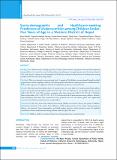Please use this identifier to cite or link to this item:
https://hdl.handle.net/20.500.14356/1305Full metadata record
| DC Field | Value | Language |
|---|---|---|
| dc.contributor.author | Paudel, Rajan | - |
| dc.contributor.author | Gurung, Yogendra Bahadur | - |
| dc.contributor.author | Poudyal, Amod Kumar | - |
| dc.contributor.author | Khatri, Bijay | - |
| dc.contributor.author | Bhatta, Deepak Raj | - |
| dc.contributor.author | Acharya, Dilaram | - |
| dc.contributor.author | Singh, Jitendra Kumar | - |
| dc.contributor.author | Adhikari, Min Raj | - |
| dc.contributor.author | Sapkota, Ranjan | - |
| dc.contributor.author | Mahotra, Narayan Bahadur | - |
| dc.contributor.author | Upadhyaya, Dipak Prasad | - |
| dc.date.accessioned | 2023-05-04T10:43:15Z | - |
| dc.date.available | 2023-05-04T10:43:15Z | - |
| dc.date.issued | 2020 | - |
| dc.identifier.citation | PaudelR., GurungY. B., PoudyalA. K., KhatriB., BhattaD. R., AcharyaD., SinghJ. K., AdhikariM. R., SapkotaR., MahotraN. B., & UpadhyayaD. P. (2020). Socio-demographic and Healthcare-seeking Predictors of Undernutrition among Children Under-five Years of Age in a Western District of Nepal. Journal of Nepal Health Research Council, 18(3), 488-494. https://doi.org/10.33314/jnhrc.v18i3.2875 | en_US |
| dc.identifier.issn | Print ISSN: 1727-5482; Online ISSN: 1999-6217 | - |
| dc.identifier.uri | http://103.69.126.140:8080/handle/20.500.14356/1305 | - |
| dc.description | Original Article | en_US |
| dc.description.abstract | Abstract Background: Undernutrition is highly prevalent in Nepal, which interferes with physical and mental development among children. It is one of the severe health problems contributing to the significant portion of the disease burden. This study aimed to explore socio-demographic and healthcare-seeking related predictors of undernutrition among children under five years old in Dang, Nepal. Methods: This was a descriptive cross-sectional study. A sample of 426 children was participated through stratified proportionate random sampling to identify socio-demographics and healthcare-seeking predictors of undernutrition. Multivariable regression was applied to identify the independent predictors of undernutrition. Results: This study found that children below 24 months of age were more likely to be undernourished than children aged 24-36 months. Female children (OR=2.32, 95% CI: 1.19-4.54), illiterate or non-formally educated women (OR=4.09, 95% CI: 1.84-9.08), mother’s occupation other than a housewife (OR=13.05, 95% CI: 4.19-40.68), labor work of father (OR=2.40, 95% CI: 1.04-5.57) had increased risk of undernutrition among children. Similarly, food insufficiency from their land, antenatal care visit, postnatal care visit, and delivery place were significantly associated with childhood undernutrition among children. Conclusions: The study showed that undernutrition among children is associated with age and gender of children, educational attainment of the mother, food sufficiency, health-seeking practices of the mother during pregnancy, delivery, and postnatal. Socio-demographics and health-seeking practices related predictors must be explicitly considered to address undernutrition among children under the age of five years. Keywords: Children; health care seeking; Nepal; socio-demographic factors; undernutrition. | en_US |
| dc.language.iso | en | en_US |
| dc.publisher | Nepal Health Research Council | en_US |
| dc.relation.ispartofseries | Jul-Sep 2020; | - |
| dc.subject | Children | en_US |
| dc.subject | Health care seeking | en_US |
| dc.subject | Nepal | en_US |
| dc.subject | Socio-demographic factors | en_US |
| dc.subject | Undernutrition | en_US |
| dc.title | Socio-demographic and Healthcare-seeking Predictors of Undernutrition among Children Under-five Years of Age in a Western District of Nepal | en_US |
| dc.type | Journal Article | en_US |
| local.journal.category | Original Article | - |
| Appears in Collections: | Vol. 18 No. 3 (2020): Vol. 18 No. 3 Issue 48 Jul-Sep 2020 | |
Files in This Item:
| File | Description | Size | Format | |
|---|---|---|---|---|
| 2875-Manuscript-18847-1-10-20201115.pdf | Fulltext Article. | 196.67 kB | Adobe PDF |  View/Open |
Items in DSpace are protected by copyright, with all rights reserved, unless otherwise indicated.
